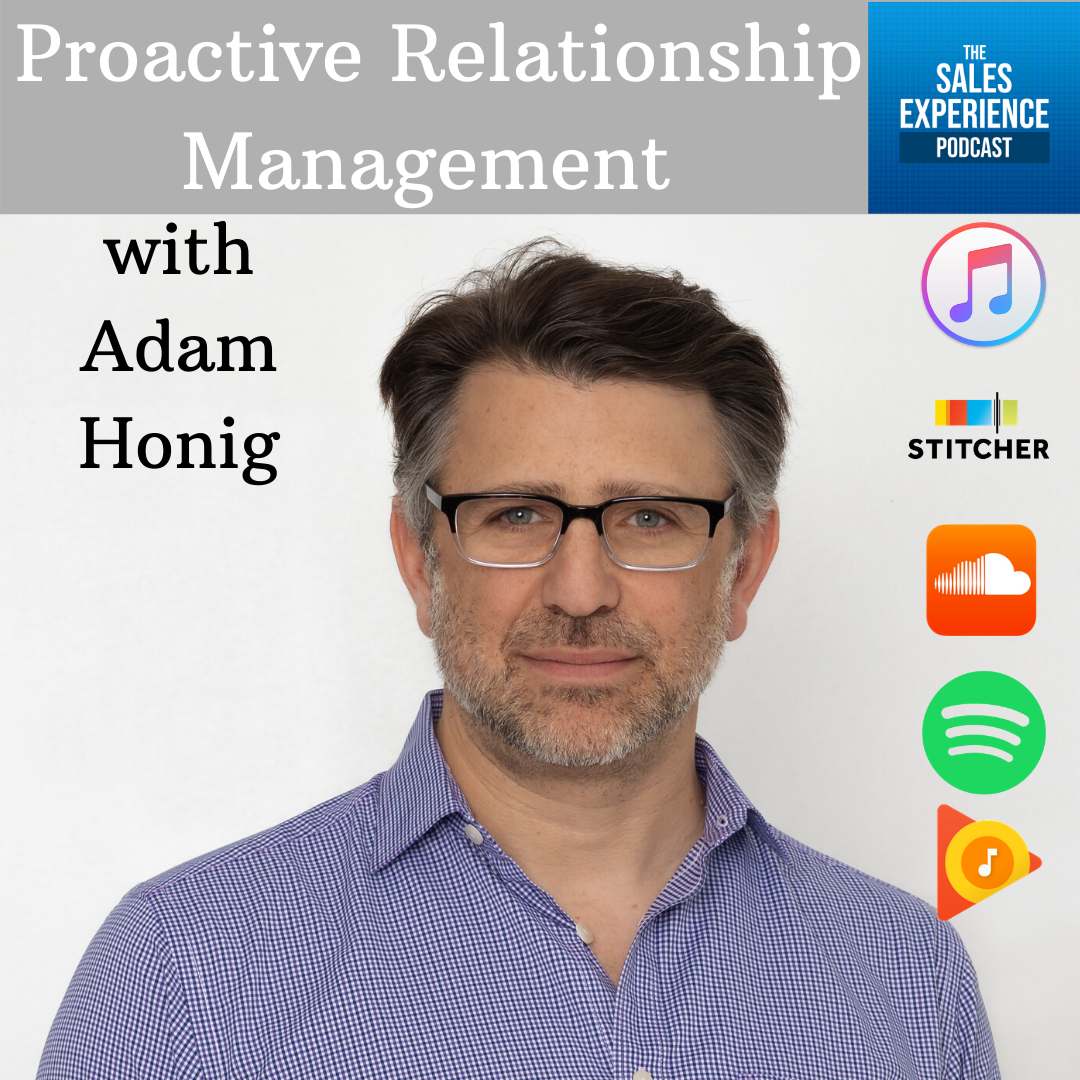Show Notes
Bob Sager, founder of SpearPoint Solutions, joined me on the show for a conversation about creativity, profitability, and effectiveness in business and sales.
Some gems from Part 1:
“The reality is we’re all born as creative thinkers.”
“But if you’re doing things and selling that are exactly like all the other salespeople, you’re going to be perceived exactly the same as them.”
Download The Power of Authentic Persuasion ebook
Enroll in the Authentic Persuasion Online Course
Get help with your sales team
Connect with Jason on LinkedIn
Connect with Bob on LinkedIn
Bob’s Bio
The founder of SpearPoint Solutions, LLC, Bob’s professional background includes over three decades of experience in sales, leadership and training. He uses that experience and innovative thinking to develop business strategies that help organizations get unstuck. He also facilitates training on methods of thinking more creatively that can help any business or nonprofit thrive in the today’s economy. Among other accomplishments, Bob is the inventor of the innovative/creative thinking game, What’s the BIG Idea?™, author of the personal achievement book, Discovering Your Greatness and the book of innovative strategies and how to create them, 101 Freaking Brilliant Business Ideas: And Ten Ways YOU Can Create Your Own. He is also the host and chief innovator of the Out-THINK the Competition podcast.
Bob’s Links
Web site: www.SpearPointOnline.com
LinkedIn profile: www.linkedin.com/in/bobsager
Twitter handle: @Bob Sager
The SpearPoint Solutions company page on LinkedIn: www.linkedin.com/company/spearpoint-solutions-llc
Company page on Facebook: www.facebook.com/SpearPointSolutions
Links to Bob’s books:
Discovering Your Greatness: A Higher Level Thinking and Action Guide
https://www.amazon.com/dp/B0752Q2NXZ
101 Freaking Brilliant Business Ideas: And Ten Ways YOU Can Create Your Own
https://www.amazon.com/dp/B07NQ1X9KP
This book is published by our company. I curated the content and am one of 39 contributing authors.
Living a Wealthy Life: Stories of Gaining an Abundance in All Five Forms of Wealth
https://www.amazon.com/dp/B074TY55M7
Author page (where people can access all my articles) at Valuewalk.com
E208 – Transcript
Jason: Welcome to the sales experience podcast. On today’s episode, I have Bob Sager, founder of spear point solutions along with lots of other things, books, courses, programs, whatnot. With over three decades of experience in sales, leadership and training, he brings all of that to help organizations develop innovative thinking and strategies to basically get on stock and go to a higher level. Bob, welcome to the sales experience podcast.
Bob: Jason, it’s a pleasure to be with you.
Jason: So first off, and I’ve got to point this out, we got connected through the amazing Adam Connors who was a guest on my show in this season too. Like I met him to have him on the show because he’s such a great networker and I wanted to talk more about that for my audience and then doing what he does best. He connected us and so I wanted to shout on him and appreciate him. And you know, I’m sure you value that relationship as well with him.
Bob: Oh yeah. Adam’s one of my favorite people.
Jason: Yeah, he is a nonstop connector and what I love most about him and anyone who didn’t listen to those episodes, make sure to check that out. But a great connector and a great networker is all about helping other people and getting them what they need without kind of a handout and expectations back. So I really appreciate him and he pushed several times for us to talk because we’re both so busy. He’s like, yeah dude, you need to get Bob on your show because Bob is amazing. So here we are finally.
Bob: Oh, I’ll try to live up to that.
Jason: Lots of pressure. So now this is a sales related podcast and you are in many different things all around strategy and innovation. But the topic I want to start with for people who are unfamiliar with you is that you focus on the innovation side, but not just the innovation. Like how do we bring in technology and it’s 2020 so how do we automate an AI and all these things, but more of like creative thinking.
Jason: And I want to talk about where that intersects or how that’s a powerful tool for anybody, specifically sales reps, managers, people who are running a sales team and where creativity really should fit in.
Bob: Well, look, there’s sort of a popularization. Of innovation and technology being equal. But that’s really not the case. I mean innovation is just doing anything better. So when you think about innovation, it’s natural in today’s world would think, Oh, innovation equals tech. But that’s not necessarily the case. It’s doing anything that we do in a better manner. So I think really that’s where creative thinking comes in. If it’s okay with you, Jason, I’d like to dispel a notion right up front.
Bob: People have a tendency to equate creativity, artists, musicians, authors, people who can do design take great photographs. And that is creativity, that artistic creativity. But that’s really only one little narrow segment of creativity. The reality is we’re all born as creative thinkers. And I mean, think about this. Do you ever watch a child, especially a preschooler. All they do all day long is learn new things and imagine new possibilities. And then we shift them to highschool and that’s no longer encouraged. Yeah. And in some cases it’s actively discouraged. And talking about this training conference I did yesterday, kids are taught that there’s one answer. And why is the one answer? Because that’s what’s on the test, right? So they’re not really encouraged to think about new and different ways to do things. And so if we didn’t exercise our bodies eventually or muscles would atrophy and we wouldn’t be able to use them.
Bob: I mean, if I tried to go out and run a marathon today, I probably fall over from a heart attack. I do get some exercise, but, well, I’m not used to running like that. Like you know, I was when what I used to imagine myself to be an athlete. So that’s just the same way with creative thinking when you haven’t used that skillset in a while, you kind of have to awake that thing up, get it up out of bed. But when you do, but some of the training we call fun shops, training fun shops that we do, by the way, I call them that because you’re not at work. Right. That wakes people’s creativity up and quite frankly, they usually shock themselves and what they’re able to come up with. Like how was I able to come up with that idea to do that, that way?
Bob: A great question for people to ask, that sort of thing opens up their mind is in what ways might I, like if you’re a salesperson and you’re thinking, well, I’m having a really difficult time getting an appointment to see this person. In fact, I widened the circle word other in there and what other ways my eye other than just trying to beat up the gatekeeper. Right. And so I think as it applies to sales, I don’t think that’s really any different than it applies in the marketplace generally. But if you’re doing things and selling that are exactly like all the other salespeople, you’re going to be perceived exactly the same as them. So you’re going to get the same reaction. And that’s probably not what you want.
Jason: No, and it’s interesting because that’s one of the big things I focus on and had been telling sales teams for the last couple of years. If everyone is doing it a certain way, we want to figure out a different way. Right? So if everyone is doing cold calling, which is the, at least that’s what it feels like is the common occurrence right now. Especially when I looked through my LinkedIn feed, like where everyone’s just talking about and promoting the millions of cold calls that they’re making in a sales role. Then how do you do it differently? How do you approach it differently? How do your conversations differ? How do you treat those interactions differently to move them forward instead of being like them? I mean that’s one of the big things. I don’t necessarily teach a lot of closing lines and closing tactics because customers are used to that. Like prospects see those things coming and it makes them shut down. So how do you move somebody forward and in a different way?
Jason: I love the aspect of what you’re saying, which is the creativity part. Because I know for myself, I don’t use that label enough. When working, let’s say specifically with sales reps where like, okay, let’s be creative and figure this out. It’s more of let’s figure this out, but not tying it to that muscle of creativity like as a specific label and saying, okay, we are going to get creative. Now what I do know is as a sales manager and a sales leader, the really effective ones talk to a salesperson who’s struggling, hitting a wall like they’re stuck on a deal or whatever it might be, and then can come up with this creative, innovative solution outside the box and say, okay, well let’s try this approach differently. Like in, that’s where the creative comes in being kind of separate from the trenches by a layer. That always helps too.
Bob: Oh, we talked yesterday in the fun shop that I did yesterday about we did an exercise where we were coming up with new ideas for marketing and that’s a real challenge. In fact, one of the gals that set that up told me after my training was over, she said, I’m so glad that we did this because we’re always talking about we’ve got to come up with ideas for better ways to market. And we almost kind of never get to it. Yeah, and I think probably one of the reasons that that is is people develop comfort zones in their life, right? You burn a lot of calories when you’re thinking consciously and so your body has sort of programmed itself to once you’ve learned how to do something to move that to subconscious reality where you don’t have to constantly think about it any more. When was the last time you consciously thought about how to walk
Jason: Or drive the car right versus when you were 16 when it was like a huge mental task to do all the steps right.
Bob: Or tie your shoes or anything else that your subconscious figures out that, okay, we did it this way before we didn’t die and so this is the way we’re going to do it from now on.
Bob: Or the same way in how they think about problem solving in that they think they’re thinking new thoughts about it. Well, what they’re really doing is going a hundred miles an hour on a circular freeway and it seems like they’re going somewhere. Well, they’re going to come right back around to the same thing, and so what creative thinking does is it gives them an off ramp to go into and explore new worlds and new thinking and seeing new solutions that previously were invisible.
Jason: Yeah. It’s interesting because I think that’s some of the value of people like yourself and I with when we’re going to an organization do a training session or on a consulting basis, is to facilitate that and create that space where it’s okay to think about things creatively, come up with ideas, brainstorm, just go wild with that list. Like I’m just imagining you in this fun shop where it’s literally like whiteboard or a big piece of paper writing out ideas.
Jason: Nothing is too crazy. Like let’s throw it all against the wall and let’s just see what comes up with. But most people, like you said, they’re in their comfort zone. They’re afraid of going outside of it because outside of comfort zone could be death. And so they don’t want to come up with new ideas or be the one who says, Hey, maybe we should try renting a skywriting plane, put our marketing message out. Right? Like no one wants to come up with that. But in a group when it’s facilitated, you never know what’s going to come up.
Bob: Right. And you know, one of the things that I tell people at the beginning before we jump in and we play games, right? As opposed to just sort of a brainstorming because people lack some structure, right? And they like to compete, right? We will play a game where we’ll have a sort of a little round Robin tournament of coming up with ideas and the people that are in there are judging the ideas, right?
Bob: So it’s sort of like you’ve got business A competitor B. yeah. And the people that are deciding on the ideas or the customers, right? And so when you have that kind of a system, that sort of a structure and you make it fun and people are laughing and I tell them up front, there’s no such thing as a bad idea. In fact, sometimes you ought to come up with the most ridiculous idea where you think this is the most ridiculous idea you can. Right? I mean, imagine that you came up with an idea for a taxi company that owned no vehicles, right. Or combinations company that own no hotel room. Right? I mean those sound like ridiculous ideas and yet both those things exist in the world today.
Bob: Right? The first product I ever invented was inspirational poster called: “Impossible is an opinion.” It had the title in the middle, Jason, and then around the perimeter were all these things down through history that people had said were impossible but ended up not being impossible.
Jason: Like going to the moon or the four minute mile.
Bob: And those were two of them. Yeah. And there was a real doubt on the nuclear energy. Right? So that was impossible. And look for the people who said that for them, it probably wasn’t possible. But that doesn’t mean it’s actually impossible. It was just impossible for them because that was their belief. And if you believe something for you, it’s true.
Jason: That’s it for part 1 of my conversation with Bob Sager. Please make sure to subscribe to the show so you can catch all the episodes in this four-part mini series that we’re doing. And as always, keep in mind that everything in life is sales and people remember the experience you gave them.
![[E208] Higher Level Thinking with Bob Sager – Part 1 of 4](https://episodes.castos.com/salesexperiencepodcast/images/TSEP-Bob-Sager-Cover-Image.png)


